- Home
- Joseph Bruchac
Brothers of the Buffalo Page 26
Brothers of the Buffalo Read online
Page 26
Except they were not. What the Englishman found was neither fortune nor buffalo hunting. Even before he reached the buffalo hunters’ camp, he had been passed by a wagonload of men heading lickety-split in the opposite direction. They had not paused to greet him. They had just kept whipping their team like the devil was after them.
When Fletcher got close enough to look down into the valley, he thought he saw lots of little hills around the buildings of the buffalo camp. He also took note of a number of black lumps atop the corner posts of the corral. When he got closer, he realized that those hills on the level ground around Adobe Walls were the carcasses of horses and half a dozen or more headless bodies of Indians. And those black lumps stuck on stakes atop the corral’s corner posts were the heads of those dead Indians.
Everything there stank of death. There were more swollen bodies of dead horses and mules inside that corral—all with so many arrows still sticking out of them, they looked like porcupine quills.
As Fletcher came closer, he saw four graves.
Two men were sitting on chairs in front of the store, resting after having helped load up a wagon with buffalo skins.
“Wondering whose last resting places those might be?” the younger of the two men asked. He was cradling a Sharps rifle in his lap. His companion was twirling a .45 Colt.
“Ah, yes,” Fletcher answered, not knowing what else to say.
“Those were the four unfortunates who fell during the last three days of fighting,” the other man answered, switching his gun from one hand to the other. “Three to the arrows and bullets of the Indians. Fourth man shot and killed himself while climbing a ladder after the fighting ended.”
“Ah, I see,” Fletcher replied.
“I guess you do,” the second man said with a little smile. “But I am forgetting my manners. This here is Mr. Billy Dixon, the finest shot with a long gun in the West. And my name is Mr. Bat Masterson. And you are...?”
“Fletcher,” the young Englishman replied. “I came out to hunt the buffalo.”
“Not exactly the best time.” Billy Dixon said, shifting the gun in his lap.
“Yup,” Masterson agreed. He held his revolver to one side and squinted as he looked down the barrel.
“What happened here?” Fletcher had then asked.
And in a few words, Masterson had told him. Just as Fletcher was now about to tell Lieutenant Pratt. Wash leaned his ear closer to the door.
“No fewer than a thousand Indians attacked them at dawn,” Fletcher said. “A great horde of screaming savages! Savages!” His own voice was pretty near a scream. From the sound of a chair scraping back and the brief silence that followed, Wash imagined the lieutenant moving over to try to calm the near hysterical Fletcher.
“Go on,” Lieutenant Pratt’s calm voice said.
A moment later, his voice more under control, Fletcher continued his tale. The hero of it, it seemed, was that same Billy Dixon. Dixon had known something was up even before the attack. He’d scouted the Indians and knew they were on their way. So he had been waiting long before sunrise with his big .40 loaded. His accurate shooting had put the fear of God in the Indians.
“His last shot that ended it all,” Fletcher said, “was taken from more than two miles away, and it killed the great chief of all the Indians.”
Wash smiled at that. He was well aware of just how far away a good shot might hit the mark with a Sharps. But he was as skeptical of that two-mile shot as he was of Fletcher’s next claim, that more than five hundred Indians had been slain in that fight.
“Still, despite their losses,” Fletcher continued, “it had been a dreadfully close thing, with hundreds of red Indians beating on the walls and doors of their buildings. Mr. Masterson opined it was the sturdy log walls absorbing the rain of bullets and arrows as much as their guns that saved them from slaughter.”
There came a pause. Then, polite and unconcerned as if all that young Englishman had been talking about was the weather, Lieutenant Pratt’s voice broke the silence.
“Might we offer you a night’s hospitality here, sir?” he asked.
Fletcher’s first answer was a nervous bark that might have been meant to be a laugh but sounded more like a sob. Then, as he controlled himself, he answered more politely but with no less emphasis. “No, kind of you to ask. Not at all, no, sir. Have to go. Do have to depart.”
Feet began to approach the door. Wash quickly stood back at attention. He watched as the young Englishman awkwardly mounted and galloped away, heading north as fast as he could.
I reckon that he calculates up there in Kansas there will be considerable less chance of losing his scalp. Especially with the war that is sure to come.
War. It was what everyone talked about now, most of them with excited anticipation. Wash could understand why. A war would bring a change from the everyday routine of drilling and drudgery that was the life of a negro cavalryman. In the months that had passed since he had arrived on the frontier, things had not gone as he had thought they would. His plan of proving himself to be a man, making something of himself, and providing for his family had been complicated by more things than one. First were the changed circumstances of his mother and sister. Second was the relationship growing between himself and Bethany. He’d never worried about his own safety before. He reckoned that he was still not all that afraid of death. But the prospect of losing his life in battle and never seeing her face again was too much to bear.
And there was a third thing as well. The prospect of shooting Indians was no longer thrilling. He’d come to see them as men, not faceless enemies. He now found more sympathy in his heart for their Indians than for the buffalo hunters. He felt a sort of tie with them, in fact. In some ways, a Buffalo Soldier, despite the fact that he wore the uniform of the United States Army, was closer to the Indians than to the white men—who despised them both.
It wasn’t just the unreconstructed rebels or the civilians in the towns. A great many of the white officers and enlisted men viewed all negroes, soldiers or not, as inferior beings. They called them apes or worse. They doubted the courage and intelligence of every colored soldier, even those under their command.
There were exceptions. Lieutenant Pratt, more than almost any other white man, always treated his black troops with firm respect. But far too many white men would not mind seeing every Buffalo Soldier killed in battle. Wash had no doubt that in any Indian fight, it would be Buffalo Soldiers pushed to the fore, to kill or be killed.
At dawn on July 4th, Wash stood at the gate of the fort looking out onto the plain. In the past few days, more word had reached them about the events at Adobe Walls. Though the number of slain Indians had been considerably fewer than the excited Fletcher had claimed, there was no doubt that the Indians had retreated with serious losses. And the long-range shooting of Billy Dixon had been verified by every survivor’s story. It seemed as if he and his friend Mr. Masterson were on their way to becoming legends of the West.
One of the most interesting pieces of news, to Wash at least, had been that there was a light-skinned negro fighting on the side of the Indians. Moreover, that negro had been playing a bugle and leading the charges. Though dressed as an Indian, it was suspected that he had been a Buffalo Soldier based on the evidence of that bugle. But the man had not survived. He’d been shot, it was said, while grabbing a can of coffee from one of the wagons. His head had been one of those stuck up on the poles at Adobe Walls.
Wash shook his head as he watched the rising sun. My, my. So now we know what befell Old Landrieu.
Contrary to expectations, they not been sent out to provide any help to the buffalo hunters at Adobe Walls. The opinion of General John Pope, their overall commander, had remained the same. Those buffalo hunters got what they were asking for. Not a single soldier would be wasted in their defense.
Wash had the nagging feeling, though, that sooner or later conflict would find them. He lifted his hand to shade his eyes as the sun just cleared the hill to the
east of the fort. Something coming. A cloud of dust that resolved itself into white man on a little sorrel. As he approached the gate, Wash saw the man’s horse was so lathered up it was about played out. It looked to have been ridden through the night.
“Hold on,” the rider called out. “Hold on!”
Wash slung his rifle over his back and stepped forward to take hold of the reins.
“Johnny Murphy,” the rider panted as he slid off his horse.
Wash recognized him as one of the civilian workers at the Darlington Agency, seventy-five miles away. His legs were so cramped up by the hard ride that he almost dropped to his knees. Wash took his arm to help him steady himself.
“Cheyennes,” Johnny Murphy wheezed. “Oh Lordy. Cheyennes. Take me...to your officer.”
Wash handed the sorrel off to the other man on guard at the gate and half-carried Murphy to Colonel Davidson’s quarters.
“Cheyennes,” Murphy said as soon as he saw the colonel, “Cheyennes…” Then his voice and his legs failed him.
“Over here,” Davidson said, pulling out a chair and steering the exhausted messenger into it. “Drink this.” He handed him a cup of warm coffee.
After the first sip, some color returned to Johnny Murphy’s face. After the second sip, he took a deep breath and sat up straighter. And though his breath was still labored, he was able to get out his message.
“Near...the...entire...Cheyenne...Nation...has...bolted,” Murphy panted. “They have...painted up...and gone off...on the war path. Close to...three thousand of ’em.”
Three thousand Cheyennes on the war path. Only three hundred or so Indians had chosen to remain at the agency under the leadership of Little Robe and two other friendly chiefs. The hostiles had already begun raiding all around the agency. They had not only stolen horses. They had also killed several settlers. Agent Miles feared for the lives of himself and his staff. His message was a plea for help to be sent at once.
Early as it was, it did not take long before they were in action. No time for chow, as men grabbed whatever biscuits and bacon they could stuff in their saddlebags.
“Mount up,” Sergeant Brown barked.
And just like that they were on their horses and the whole of the company was on its way and proceeding north posthaste.
But at the end of the daylong ride, there was no fight to be had. The hostile Indians had all slipped away. Colonel Davidson was fit to be tied. But Lieutenant Pratt seemed not at all upset. He turned to the men and raised a hand like an orator.
“Each time they run,” Pratt said, his voice ringing like a preacher’s, “the army shall follow. These plains may be theirs now, but the day of their rule is almost done. We shall harry them as the hound does the hare, drive them from their places of refuge and defeat them utterly.”
Johnson, the head Tonkawa scout, reined in his horse next to Wash, leaning close so that no one else could hear him.
“Longnose likes to hear his own voice,” Johnson said, his voice low as the humming of a bee.
Wash managed not to smile. Longnose, he’d learned, was what the Tonkawa scouts called the lieutenant. Pratt’s nose being big and hooked like that of a bird of prey, Wash could see how the moniker suited him.
Lieutenant Pratt was now quoting the Bible. Wash recognized it. One of the lesser known parts of the Good Book: Zechariah, Chapter Ten, Verse Five.
“We shall be as mighty men, who tread down their enemies in the mire of battle,” the lieutenant intoned, “and we shall fight because the Lord is with us, and the riders on horses shall be confounded.”
Unlike most of the Bible-thumpers Wash had heard, Pratt got only one or two words wrong. Wash turned to look again at Johnson, who had been listening intently to the lieutenant’s words. But there was no amusement on Johnson’s face now, only sorrow. The Tonkawa scout shook his head ruefully. “Longnose is right about that. The time of all of us riders on horses will soon be done.”
CHEYENNE VILLAGE, August 29, 1864
Sir:
We received a letter from Bent, wishing us to make peace. We held a consel in regard to it. & all come to the conclusion to make peace with you, providing you make peace with the Kioways, Commenches, Arrapahoes, Apaches and Siouxs.
We are going to send a messenger to the Kioways and to the other nations about our going to make [peace] with you. We heard that you have some in Denver. We have seven prisoners of yours which we are willing to give up, providing you give up yours.
There are three war parties out yet, and two of them are of Arrapahoes. They have been out some time, and exspect now in soon. When we held this council, there were a few Arrapahoes and Siouxs present. We want true news from you in return, —that is, a letter.
BLACK KETTLE, and other chieves.
MEDICINE WATER’S
WORST
Never again would so many of their people from so many of their tribes join together in battle. Wolf felt that in his heart as he watched the great war party scatter like a great flock of birds startled by an eagle.
The Kiowas were riding off to the west. They had a place to go where they believed no one would ever find them, the great canyon of the Palo Duro.
“If you need a safe place,” Mamanti said, “you Cheyennes come and join us. We will be protected by the canyon’s great stone arms. We can strike from there, make the stinky white men cry, and then retreat within its walls. No white men can ever enter there.”
Mamanti. Sky Walker. He was a man Wolf felt he could trust. It was said that he could truly see the future. Far more of a medicine man than Isa-tai. But in Wolf’s heart he wondered if even the stone arms of the Palo Duro could protect them now.
The Quahadi Comanches were heading south. They were still following Quanah, whose disgraced little medicine man was trailing behind them.
“I will fight and keep fighting even when all others quit,” Quanah vowed. “In Texas and Mexico, we will keep warring on our own.”
But what of us? Wolf thought.
The Cheyennes were divided about what to do. They had suffered the heaviest losses from the long shooting guns of the buffalo hunters. Those among them who had died were Walks on the Ground, Horse Road, Spotted Feathers, Stone Teeth, and Coyote. Others were so badly injured that all they and their families wished for now was to find a quiet place where they might either recover from their wounds or die peacefully.
But there was one who still had war burning in his heart. Medicine Water. The death of so many at Adobe Walls had just added wood to the fire within him. His grudge against all whites went back a long way. His brother had been killed by white men. Although it was twenty winters ago, Medicine Water had never forgotten. He had been the first Cheyenne to take the war pipe from the Comanches.
“I will keep fighting,” he growled. “I will make all the whites cry.” “And I will be beside you,” his wife, Mochi—Buffalo Calf Woman—said.
Wolf saw the determination in her face. She seemed even fiercer than her husband in her desire to keep striking the enemy. Again, it was easy to understand why. She had lost her first husband and all the rest of her family at the Big Sandy River. It had turned her into a warrior woman. She did not stay with the other women when fighting took place. She joined in with the men. When they had attacked the buffalo hunters’ camp, she had been among the fighters. She had charged down the hill. She had fired her rifle and dared the cowardly white men to come out and fight like men.
“My husband and I will kill any ve’hoe we see,” she declared. “Who will join us?”
She and Medicine Water looked straight at Wolf. He read the question in their eyes.
Am I angry enough to ride with them?
There was much anger in his heart. He, too, remembered the Big Sandy. He had just seen his closest friend die. The white men took so much and kept taking. But he worried about his mother and sister. Would they be safe if he went off with Medicine Water and Mochi?
Wolf also suspected that the burning anger of Medicine Wat
er and Mochi would not just be turned toward their real enemies. It would be directed at all ve’hoes, even innocent ones. He did not want to be a killer of women and children.
He made the sign for no. He turned Wind’s head back toward the camp where his family was waiting. Mochi called something out at him. He paid no attention to her insulting words.
He had not gone far before he heard someone riding behind him. It was Gray Head. The old chief drew his horse so close that their knees touched.
“Nephew,” he said. He put his left hand on Wolf’s shoulder. He said nothing further. He understood all the feelings of despair and confusion and anger fighting inside Wolf. The losses he has experienced in his long life have been even greater than mine, Wolf thought. Yet still he tries to follow the road of peace.
They rode together for a time without speaking. Then they came to a small stream. It was one of the few still running in the drought that was strangling the land. They paused to let the horses drink.
“What will we do now?” Wolf asked.
“The best we can,” Gray Head answered.
Gray Head’s band of a few dozen families did not return to the agency. They feared they would be punished by the army. But they did not try again to make war. They avoided fighting. For horses, at night they raided the corrals of white men with big herds. Those white men would not suffer from the loss of a few ponies. They hunted as best they could. Most of the game was gone from the land. When they could find nothing else, they took cows from large herds. A few animals might not be missed. They did not attack any white settlers. When soldiers tried to attack them, Gray Head knew the ways to escape. They knew their own land better than anyone else. Their land helped them.

 Peacemaker
Peacemaker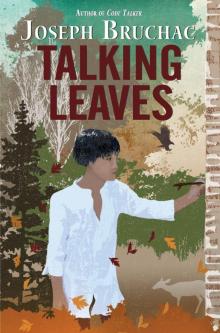 Talking Leaves
Talking Leaves Found
Found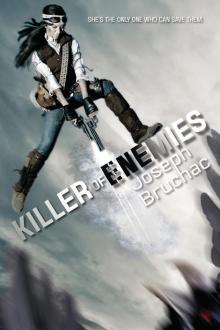 Killer of Enemies
Killer of Enemies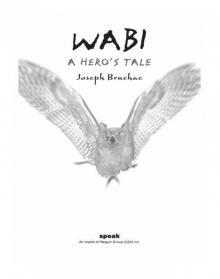 Wabi
Wabi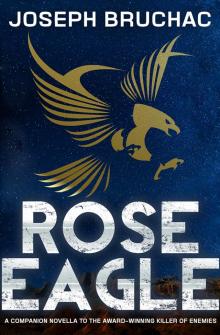 Rose Eagle
Rose Eagle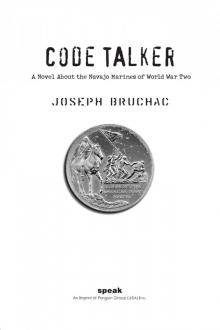 Code Talker
Code Talker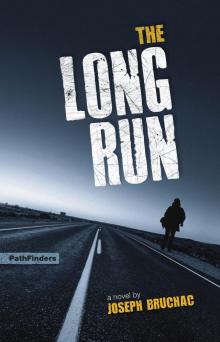 The Long Run
The Long Run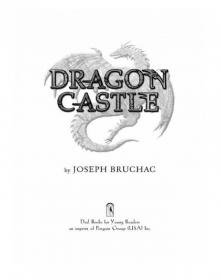 Dragon Castle
Dragon Castle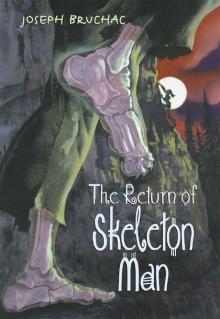 The Return of Skeleton Man
The Return of Skeleton Man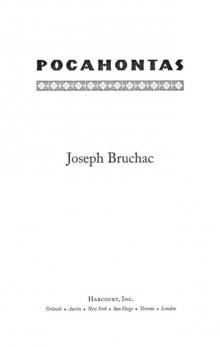 Pocahontas
Pocahontas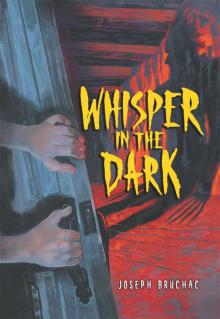 Whisper in the Dark
Whisper in the Dark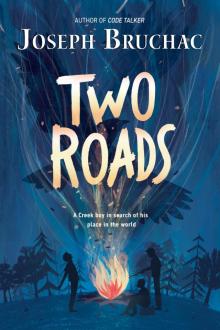 Two Roads
Two Roads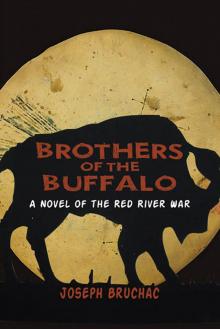 Brothers of the Buffalo
Brothers of the Buffalo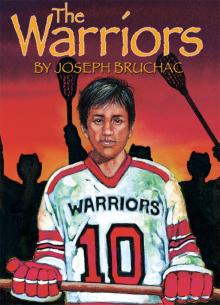 The Warriors
The Warriors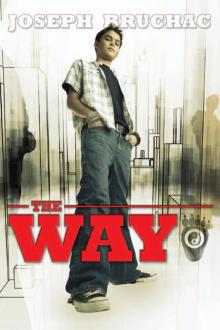 The Way
The Way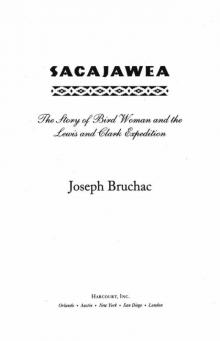 Sacajawea
Sacajawea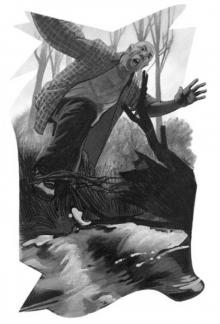 Night Wings
Night Wings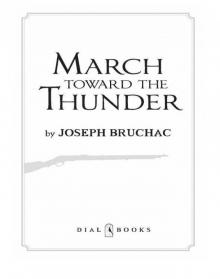 March Toward the Thunder
March Toward the Thunder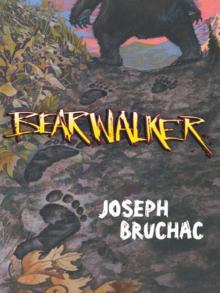 Bearwalker
Bearwalker Skeleton Man
Skeleton Man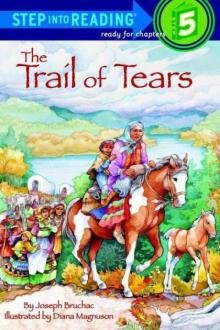 The Trail of Tears
The Trail of Tears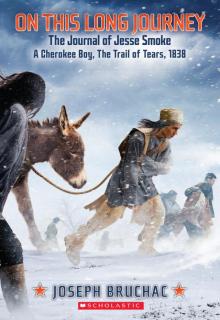 On This Long Journey
On This Long Journey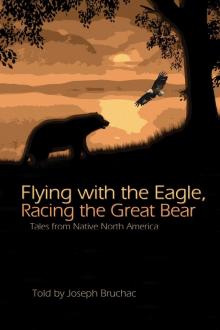 Flying with the Eagle, Racing the Great Bear
Flying with the Eagle, Racing the Great Bear